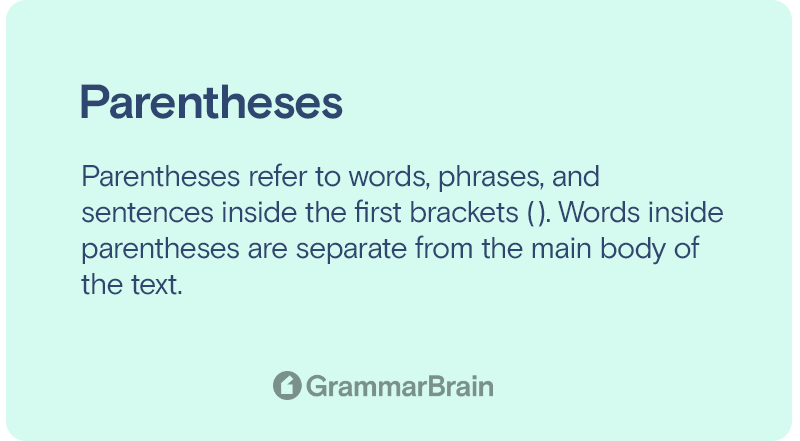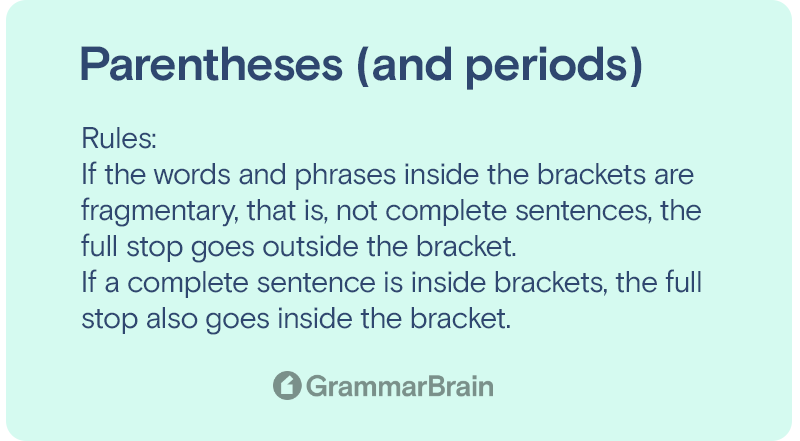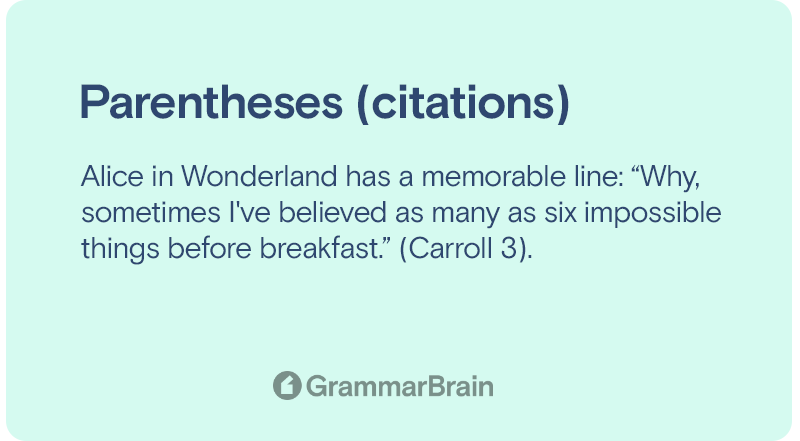Is there a period before or after parenthesis? One of the most commonly asked questions among students of the English language is whether to use a period before or after parentheses. Before getting into the answer, it’s important to understand that both options are correct depending on the variation of English and the style guide you follow.

What are parentheses?
Parentheses refer to words, phrases, and sentences inside the first brackets (). Words inside parentheses are separate from the main body of the text.
Consider the following examples:
- We went to Bucharest (the capital of Romania) last summer.
- Jahangir (the son of Akbar the Great) ruled over the Indian subcontinent.
In the above sentences, the phrases inside the brackets () are called parentheses. These phrases or words complement the main text and add information about them but aren’t part of the sentence. That is, even if we remove the parentheses, the sentence will be complete and grammatically correct.
The confusion comes when we have to use parentheses at the end of the sentence. In such cases, where do we put the full stop?
For example:
- Last summer, we went to Bucharest (the capital of Romania).
- Jahangir was the son of a Mughal Emperor (Akbar the Great.)
- I have been to Vietnam. (It was for a student exchange program.) I had a life-changing experience there.
The second example shows the wrong use of full stops in parentheses. You’ll find the explanation below.
Keeping the above sentences in mind, let’s learn more about full stops and parentheses.

Full stop inside or outside brackets?
There are some fundamental guidelines on using full stops inside or outside parentheses.
Keep the following rules in mind:
- If the words and phrases inside the brackets are fragmentary, that is, not complete sentences, the full stop goes outside the bracket.
- If a complete sentence is inside brackets, the full stop also goes inside the bracket.
These are the core rules to keep in mind to never get period usage wrong.
Let’s have a look at some examples of the same:
- I didn’t know he was a national-level athlete (in wrestling).
In this sentence, the phrase inside the bracket isn’t a complete sentence. It adds information about the subject but doesn’t stand alone as a complete expression of an idea.
- There were five people in the house. (One was a doctor, one was an engineer, and the other three were lawyers.) Safe to say, I was quite intimidated.
In this example, the sentence inside the brackets is a complete sentence. Even if we remove them from the parentheses, they will still make sense and act as a standalone sentence. That’s why the period will go before parentheses, not after.
Consider a trickier example:
- There were a few people inside the house (I didn’t know any of them).
- There were a few people inside the house. (I didn’t know any of them.) They were somewhat intimidating.
I didn’t know any of them is a complete sentence. However, we have the option of putting it inside or outside brackets. In the first sentence, we have the period after parentheses because there’s no following sentence.
In North American English, full stops are generally outside brackets if there are no following sentences. When there are sentences that follow, where the period goes depends on the completeness of the phrase/sentence.
Citations and full stops
Academic writing guides like MLA and APA have specific guidelines on how to use full stops. These guidelines are generally regarding citations.
The author’s name and page number are included in a parenthetical citation according to the MLA style.

For example:
- Alice in Wonderland has a memorable line: “Why, sometimes I’ve believed as many as six impossible things before breakfast.” (Carroll 3).
Following the author’s name in your sentence along with the age number is required for APA citation.
- Alice in Wonderland has a memorable line: “Why, sometimes I’ve believed as many as six impossible things before breakfast.” (Carroll, 1866, p. 9).
In both these writing guides, the period goes after parentheses for citations. There are no ambiguities here since citations are never complete sentences with standalone meanings.
As far as using parentheses in the text is considered, these writing guides follow the same rule. If the text within parentheses has complete and standalone meaning, the period goes before the parentheses. Otherwise, it goes after the parentheses.
Commas before or after parentheses?
Commas go inside parentheses if it’s necessary to express the complete meaning of a sentence. For phrases and words, commas generally go after parentheses.
Consider the following examples:
- There were five people in the room (two men, three women), and I was the sixth.
- There were only five people (all women), and I was the sixth.
For complete sentences inside brackets, commas, full stops, and other punctuation marks go inside brackets.
For example:
- I was walking alone in the woods. (My friend was following me, but he appeared visibly shaking.) Before long, we saw something that left us terrified.
- Mary is a diligent student. (She scored straight As all her life, with only occasional Bs). But suddenly, she stopped studying altogether.
We hope this guide answers all your questions about using periods before and after parentheses.
FAQs
When do full stops go inside brackets?
Full stops go inside brackets when we have a complete, standalone sentence inside the brackets.
When do full stops go outside brackets?
Full stops go outside brackets when we have words and phrases (without complete meaning) inside the brackets.
Does the period go before or after parentheses for citations?
Periods are placed outside parentheses for citations in MLA, APA, and Harvard styles.
Sources
- PARENTHESES | English meaning – Cambridge Dictionary
- Period (Full Stop) Inside or Outside the Bracket? (grammar-monster.com)
- Parentheses.pdf (utsa.edu)
- APA Style 6th Edition Blog: Punctuation Junction: Periods and Parentheses
Inside this article
Fact checked:
Content is rigorously reviewed by a team of qualified and experienced fact checkers. Fact checkers review articles for factual accuracy, relevance, and timeliness. Learn more.
Core lessons
Glossary
- Abstract Noun
- Accusative Case
- Anecdote
- Antonym
- Active Sentence
- Adverb
- Adjective
- Allegory
- Alliteration
- Adjective Clause
- Adjective Phrase
- Ampersand
- Anastrophe
- Adverbial Clause
- Appositive Phrase
- Clause
- Compound Adjective
- Complex Sentence
- Compound Words
- Compound Predicate
- Common Noun
- Comparative Adjective
- Comparative and Superlative
- Compound Noun
- Compound Subject
- Compound Sentence
- Copular Verb
- Collective Noun
- Colloquialism
- Conciseness
- Consonance
- Conditional
- Concrete Noun
- Conjunction
- Conjugation
- Conditional Sentence
- Comma Splice
- Correlative Conjunction
- Coordinating Conjunction
- Coordinate Adjective
- Cumulative Adjective
- Dative Case
- Determiner
- Declarative Sentence
- Declarative Statement
- Direct Object Pronoun
- Direct Object
- Diction
- Diphthong
- Dangling Modifier
- Demonstrative Pronoun
- Demonstrative Adjective
- Direct Characterization
- Definite Article
- Doublespeak
- False Dilemma Fallacy
- Future Perfect Progressive
- Future Simple
- Future Perfect Continuous
- Future Perfect
- First Conditional
- Irregular Adjective
- Irregular Verb
- Imperative Sentence
- Indefinite Article
- Intransitive Verb
- Introductory Phrase
- Indefinite Pronoun
- Indirect Characterization
- Interrogative Sentence
- Intensive Pronoun
- Inanimate Object
- Indefinite Tense
- Infinitive Phrase
- Interjection
- Intensifier
- Infinitive
- Indicative Mood
- Participle
- Parallelism
- Prepositional Phrase
- Past Simple Tense
- Past Continuous Tense
- Past Perfect Tense
- Past Progressive Tense
- Present Simple Tense
- Present Perfect Tense
- Personal Pronoun
- Personification
- Persuasive Writing
- Parallel Structure
- Phrasal Verb
- Predicate Adjective
- Predicate Nominative
- Phonetic Language
- Plural Noun
- Punctuation
- Punctuation Marks
- Preposition
- Preposition of Place
- Parts of Speech
- Possessive Adjective
- Possessive Determiner
- Possessive Case
- Possessive Noun
- Proper Adjective
- Proper Noun
- Present Participle
- Prefix
- Predicate



